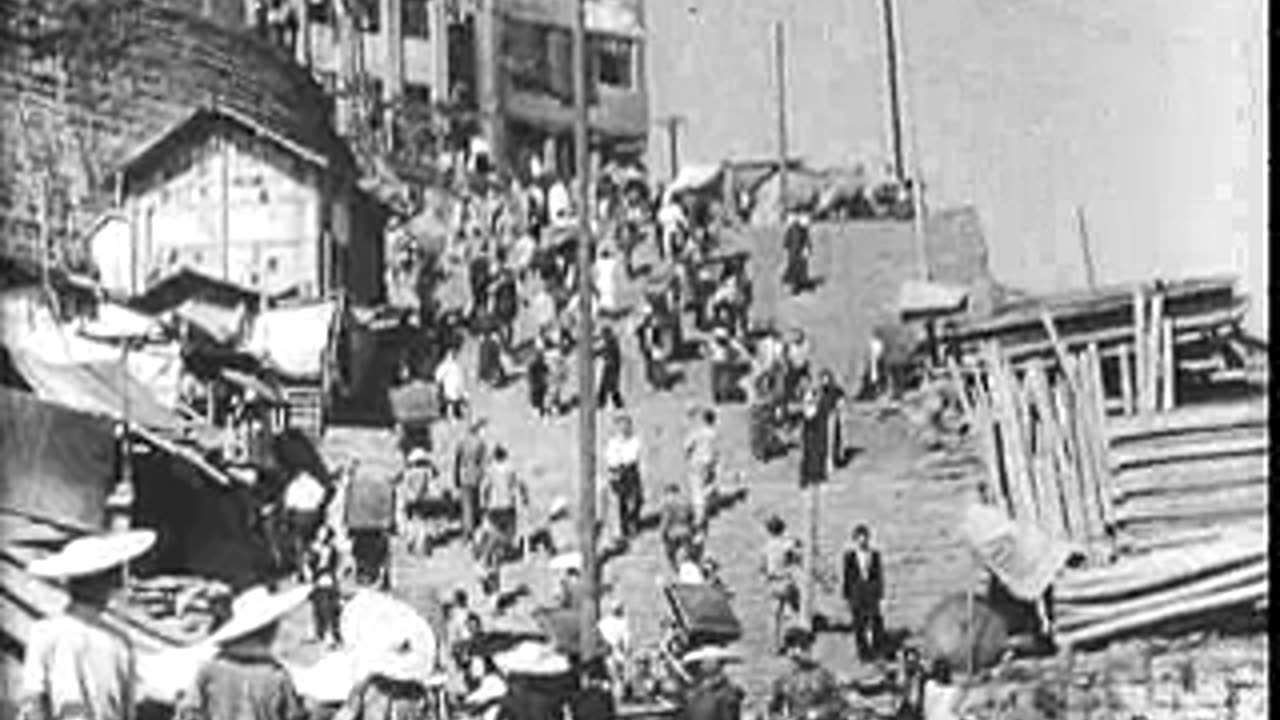Premium Only Content

CIA Archives: The Political History of China (1967)
The dark side of history: https://thememoryhole.substack.com/
China: The Roots of Madness is a 1967 Cold War era, made-for-TV documentary film produced by David L. Wolper, written by Pulitzer Prize winning journalist Theodore H. White with production cost funded by a donation from John and Paige Curran. The film has been released under Creative Commons license. It won an Emmy Award in the documentary category.
The film attempts to analyze the anti-Western sentiment in China from the official American perspective, covering 170 years[citation needed] of China's political history, from Boxer Rebellion of the Qing Dynasty to Red Guards of Cultural Revolution. The film focuses on the power struggle between the Kuomintang and the Communist Party of China, amid heavy political intervention from Moscow, with Sun Yat-sen, Chiang Kai-shek and Mao Zedong playing the pivotal role at the center stage.[1][2]
Introduction
Duration: 10 minutes and 59 seconds.10:59
Duration: 10 minutes and 59 seconds.10:59
Duration: 10 minutes and 58 seconds.10:58
Duration: 11 minutes and 0 seconds.11:00
Duration: 10 minutes and 59 seconds.10:59
Duration: 10 minutes and 1 second.10:01
Duration: 2 minutes and 2 seconds.2:02
The documentary film was made for television in 1967, during the Cold War. It was written by Pulitzer Prize-winning journalist Theodore H. White, directed by Mel Stuart, edited by William T. Cartwright, and produced by David L. Wolper.[3] Production costs were funded by a donation from John and Paige Curran.[1] The film has been released under Creative Commons license.[1]
White's access to important political figures of the time allowed him to create some rare footage, which included the wedding of Chang and the funeral of Sun. The film won an Emmy Award in the documentary category.[citation needed]
As evidenced by his commentary throughout the films, White, Time magazine's China correspondent during World War II, was scathing about the People's Republic of China. Remarking that Chinese had been suffering in a 100-year tragedy, he added:
There are 700 million Chinese [in 1967], one quarter of human kind, who are taught to hate, their growing power is the world's greatest threat to peace enlightenment. 50 years of torment, bred madness....
For 50 years, Americans have failed to help the Chinese to find "some entry to the modern world", as the Chinese have "been transformed from our greatest friend into our greatest enemy", as the Chinese have fallen into the vicious cycle of "from the tyranny of Confucius of the Manchu Emperor to the tyranny of communism and Mao.
Synopsis
Episode one
White referred to Empress Dowager Cixi as "China's evil spirit... a Manchu concubine... said to have poisoned her own son upon his throne, install her infant nephew as the emperor, killed his mother, and then imprisoned him in 1898."
Episode two
White's impression on the downfall of Qing Dynasty: "...and then it vanished, simply vanished, the Manchu Dynasty disappeared overnight, nothing like that had ever happen in all the history, 2000 years of tradition, the whole structure of the imperial confucianism, political thought, dissolving to dust...."
On post-Qing China, "out of this turbulence, there appeared two types of Asian leaders, arch symbols, the man of gun, and the man of idea, and these two types of gunman and the dreamer, have perplexed all our efforts in Asia for 50 years since, and they still perplexed and haunted all our policy, even today..."
Sun "was a man of dream, the dream of China, powerful, free of emperors and foreigners, made him from his youth a revolutionary.... Slowly from the early 1920, Sun Yatsen had somehow built a government, a tiny southern foothold at Canton, ringed by hostile warlords. By 1924 the ageing revolutionary had learned, idea and gun must go together... in 1923 he tells the New York Times: We have lost hope of help from America, England, France, the only country that show any sign of helping us in the south is the Soviet government of Russia...."
Episode three
The Kuomintang left wing "no longer trust their army leader at the front. Borodin is urging: 'Get rid of Chiang Kai-shek.' In four short years, the communist had grown 60,000 members. To hear the left wing Nationalist: 'No revolution is completed, until peasants own their land, and workers their factories.' Chiang disagreed."
Episode four
"When Mao left at 1927 with a dozen of his ally, it was as if a ghost had risen from the dead, he was disgusted with Borodin and his Russian documents. He felt the key of revolution in Asia lied in the countryside, not the big city proletariat. Mao's idea was simple, turn the hidden peasant's anger towards the local gentry, the local rich.... Mao transformed the countryside into a total environment of hate, women, children, everyone, not to be afraid to die... by 1932, he controlled a good chunk of Hunan, Jiangxi, claimed the loyalty of 9 million people."
Episode five
"Day and night the bombs continue, yet Chiang persists. Powerless to strike back, Chiang knows, only the Americans can help.... It is about this time 1941, at the height of the bombing, I had my first talk with Chiang Kai-shek, about the war with Japan, and strategy. At the end, almost just an afterthought, he said, "remember, Japanese is a disease of the skin, the communists are the disease of the heart." It seems odd to me, because at that time the Japanese were bombing the daylight out of both Chiang Kai-shek and the communist, both of them are ally against the Japanese. And now in retrospect, almost a vision of the apocalypse to come."
Episode six
On Manchuria after the Japanese surrender, "the Russian hed temporarily occupied Manchuria by the surrender term of Japan. Communist expected to get from Russian surrender Japanese equipment and guns, and hold the countryside before Chiang arrived.... Manchuria is the topic of the struggle. Industries Japan had built and left is the greatest pride in China. Chiang's American equipped troops seize all major cities, to find a hollow triumph. The Russian occupiers had rooted every factories before withdrawn, rip out shops and stores where great machines once stood."
Episode seven
"In American custody in Hong Kong there are cascades and piles of translation coming from the Chinese, these are sands, gritty, gravels, little bit of information, meaningless, because we don't know who does what to who in Peking, we don't know how they think, or how they make up their mind, because no matter how hard we study China, we cannot predict such thing as the Great Leap Forward in 1958, we can't predict such thing as Red Guard purge in 1966, as if there was struggle of sea monsters going on, deep deep beneath the surface of our vision, only bubbles come to the surface, to tell us terrible struggle, we don't know what the struggle is about."
Critical reception
While the film won an Emmy Award in the documentary category soon after its release, contemporary critics have criticized his "callous and condescending" portrayal of Chinese. Film Threat remarked that White never attempted to take on board the Chinese viewpoint, and points out there were unconfirmed rumors that the CIA was involved in the film's making.[4][5]
Wikimedia Commons has media related to China: The Roots of Madness.
See also
List of American films of 1967
Notes
China: The Roots of Madness National Archives and Records Administration, via Internet Archive, Retrieved March 25, 2011
"Another CIA/NSC Archive Film: "China: The Roots of Madness" (1967)" Archived June 6, 2011, at the Wayback Machine, Jottings from the Granite Studio, June 28, 2010, Retrieved March 25, 2011
"China: Roots Of Madness", David L. Wolper, Retrieved March 25, 2011
"China: The Roots of Madness, 1967: Movies & TV", Amazon.com, Retrieved March 25, 2011
"The Bootleg Files: China: The Roots Of Madness", Film Threat, June 11, 2010. Retrieved August 26, 2021
References
Theodore H. White Mel Stuart, China: The Roots of Madness; a Documentary (New York,: Norton, 1968).
China: The Roots of Madness at IMDb
Anti-Western sentiment has been increasing in China since the early 1990s, particularly amongst Chinese young adults.[1] Notable incidents which have resulted in a significant anti-Western backlash have included the 1999 NATO bombing of the Chinese embassy in Belgrade,[2] the 2008 demonstrations during the Olympic torch relay[3] and alleged Western media bias,[4] especially in relation to the March 2008 Tibet riots.[5]
While available public opinion polls show that the Chinese hold generally favorable views towards the United States,[6] there remains suspicion over the West's motives towards China[6] stemming largely from historical experiences and specifically the 'century of humiliation'.[7] Some allege that these suspicions have been increased by the Chinese Communist Party's Patriotic Education Campaign.[8] The reliability of public opinion polls of the Chinese population has also been questioned due to the 'political culture' in China, which may lead to respondents giving socially acceptable answers.[9][10]
Background
Qing dynasty
Foreigners shown as pig and goat and being slaughtered by Manchu officials, 1861.
Anti-Western sentiment manifested itself in the First and Second Opium Wars as well as the Boxer Rebellion when the Righteous Harmony Society attacked westerners, missionaries and converted Chinese Christians. The Qing dynasty was divided between anti-Westerners, moderates and reformists. A Manchu prince, Zaiyi, and a Chinese general Dong Fuxiang who led 10,000 Muslim Kansu Braves attacked foreigners and defeated them at the Battle of Langfang during the rebellion.[11]
Muslims
Hatred of foreigners from high ranking Chinese Muslim officers stemmed from the way foreigners handled Chinese affairs, rather than for religious reasons, the same reason other non-Muslim Chinese hated foreigners. Promotion and wealth were other motives among Chinese Muslim military officers for anti foreignism.[12]
Kuomintang anti-Westernism
Some members of the Kuomintang party held anti-Western sentiments. Kuomintang Muslim General Bai Chongxi led a wave of anti foreignism in Guangxi, attacking American, European, and other foreigners and missionaries, and generally making the province unsafe for foreigners. Westerners fled from the province, and some Chinese Christians were also attacked as imperialist agents. Westerners were attacked in the streets, with many of them fleeing to their respective consulates.[13] The three goals of his movement were anti-foreignism, anti-imperialism, and anti-religion.[14]
As a Kuomintang member, Bai and the other Guangxi clique members allowed the Communists to continue attacking foreigners and smash idols, since they shared the goal of expelling the foreign powers from China, but they stopped Communists from initiating social change.[15]
General Bai also wanted to aggressively expel foreign powers from other areas of China. Bai gave a public speech in which he claimed that the ethnic minorities of China were suffering under "foreign oppression". Bai called upon the Chinese government and the people of China to assist them in expelling the foreigners from those lands. He personally wanted to lead an expedition to seize back Xinjiang to bring it under Chinese control, in the style that Zuo Zongtang led during the Dungan revolt. It is important to note that Bai Chongxi was a Hui himself.[16]
The Blue Shirts Society, a fascist paramilitary organization within the Kuomintang modeled after Mussolini's blackshirts, was anti foreign and anti communist, and stated that its agenda was to expel foreign (Japanese and Western) Imperialists from China, crush communism, and eliminate feudalism.[17] In addition to being anti Communist, some Kuomintang members, like Chiang Kaishek's right-hand man Dai Li were anti-American, and they wanted to expel American influence.[18]
History
The causes of anti-Western sentiment in China include the collective memory of the period of Chinese history beginning with the two Opium Wars between 1839–1860 and ending with the expulsion of the Japanese after the Second World War which is known to the Chinese as the century of humiliation[19][20] when China was sacked by a western coalition. Wang Zheng wrote that it was "attacked, bullied, and torn asunder by imperialists".[21] Kenneth Lieberthal, a political science professor at the University of Michigan, has argued that the demonstrations in Western cities during the Olympic torch relay had "deep historical resonance" amongst Chinese, who suspect that after China's recovery from its fall in international stature from 150 years ago, "the West is trying to humiliate them again".[7] Supporting this view, a 2007 survey found that 45% of the Chinese general public believed that the U.S. was "trying to prevent China from becoming a great power" compared to 32% who believed that the U.S. accepted "China's status as a rising power", 23% were "not sure".[6] Although this sentiment has been partially assuaged by the return to China of Hong Kong and of Macau, the unresolved political status of Taiwan remains for some a reminder of China's weakness and division.[21]
James Kelly, former US assistant secretary for East Asian and Pacific Affairs, has noted that nationalistic sentiments and anger over the torch protests was more concentrated amongst Chinese under the age of 30.[1] Suisheng Zhao[8] and Kenneth B. Pyle[22] argue that a shift in Chinese education policy that these young adults experienced is partly responsible for their increased nationalism. Zheng Wang argues that by the 1990s the international situation had reduced the appeal of Communism as a legitimizing ideology for China's rulers. As a result, the leadership reversed many of the Chinese Communist Party's changes to Chinese historiography from 1949 that interpreted Chinese history as a history of class struggle. Announced in 1991 and fully functioning by 1994, this "Patriotic Education Campaign" reinterpreted history in national terms, rehabilitating figures like General Tso who suppressed a peasant rebellion but stemmed a Russian invasion of Xinjiang, and acknowledging the role of Chinese nationalist (rather than just communist) fighters in the Second Sino-Japanese War. Students find personal resonance more in such narratives than in previous classes about Marxist doctrine because they hear about the atrocities against China not just from history textbooks but from their parents and grandparents.[21]
From 1999
1999 NATO bombing of the Chinese embassy in Belgrade
On 7 May 1999, during Operation Allied Force, NATO aircraft bombed the Chinese embassy in Belgrade, killing three Chinese citizens. The US claimed that the bombing was an accident caused by the use of outdated maps but few Chinese accepted this explanation.[2] The incident caused widespread anger and following the attack Chinese officials described the bombing as a "barbarian act"[23] and a "war crime"[24] while Chinese students in Europe and America demonstrated against 'NATO fascism'.[2]
In China, thousands were involved in protest marches in Beijing and other provincial capitals, some protesters threw gas bombs and rocks at the diplomatic missions of the United States and other NATO countries[25] while in Chengdu the American Consul's residence was firebombed.[2]
2008 Beijing Olympics torch relay protests
Pro-China Olympic rally in Perth, Australia, 2008
Prior to the 2008 Summer Olympic Games to be held in Beijing, the international leg of the Olympic torch relay was subject to widespread demonstrations primarily over "China's human rights record and Tibetan independence."[26] In London, thirty-seven arrests were made when protestors clashed with police as the torch made its way through the city[26] while in Paris the relay was cut short and the torch transported by bus after protestors disrupted the procession.[27]
Protests also took place in Athens,[28] Istanbul,[29] Buenos Aires,[30] Bangkok,[31] Canberra,[32] Nagano,[33] and Seoul.[34] In response, Chinese government officials condemned the protests[35] and overseas Chinese organised 'pro-China' counter-demonstrations at torch processions,[36] joined by counter-protests in many Chinese cities.[3]
Despite the protests being aimed at specific issues raised through western media, Chinese state media sources, such as CCTV,[37] referred to the protestors as being 'anti-Chinese'. In one instance, Chinese state-run news source China Daily reported that "[a]ll the recent protests against the 2008 Olympic torch relay are not against Chinese government, as some protesters repeated. They are against all of the ordinary Chinese people living everywhere in the world".[38]
Chinese activists organised protests outside Carrefour stores in at least 10 Chinese cities[39] and called on shoppers to boycott the French retailer following protests in Paris. Messages distributed via the internet and mobile phones had accused the company of supporting the Dalai Lama,[40] a claim denied by Carrefour CEO Jose-Luis Duran.[41]
Media bias
Chinese netizens in both China and overseas have accused Western media sources of giving dishonest reports about riots in Tibet in March 2008. An article by the state-run China Daily reports that several Chinese activists accused, with substantiation, several Western media sources of misreporting and distorting the incident to tarnish China's image.[42] Chinese sources opined on the matter, arguing that Western media reports of the Tibet violence had displayed "ignorance and prejudice",[5] that the reporting of China more generally was "with few exceptions, only stories about censorship, spoiled food products, human rights issues, dangerous toys and the like... are published",[4] and "stoking the young people's repulsion to the West and in turn aroused the patriotic passion of the young people".[43] Several websites[quantify] were created to challenge the Western media's reporting of China, including anti-cnn.com,[44] whose founder Rao Jin[43] described Western media reporting as "white supremacy".[45]
In addition, the Chinese government has weighed in on the issue of media bias. Fu Ying, the Chinese Ambassador to the United Kingdom wrote that the Western media had attempted to 'demonise' China[46] while in April 2008, the Chinese Foreign Ministry demanded an apology from CNN after news commentator Jack Cafferty referred to the Chinese as a "bunch of goons and thugs" for which CNN subsequently apologized.[44]
James Kelly has argued that China's media censorship itself may be a major factor in fostering anti-Western sentiment, claiming that China's media gives a "very one-sided" view of the West.[1]
Tibetan independence
On 2 March 2009 the Information Office of the State Council of the People's Republic of China published a white paper entitled: "Fifty Years of Democratic Reform in Tibet". In the paper the defeat of a Tibetan rebellion in 1959 is likened to the American civil war, arguing that China's abolition of Tibetan feudal serfdom was "entirely comparable to the emancipation of the slaves in the American civil war."[47] The white paper goes on to argue that by supporting the 14th Dalai Lama "Western anti-China forces" were guilty of ignoring historical facts regarding Tibet and that:
"It is thus clear that the so-called "Tibet issue" is by no means an ethnic, religious and human rights issue; rather, it is the Western anti-China forces' attempt to restrain, split, and demonize China."[47]
Cyber attacks
Following allegations of biased reporting by Western media outlets, especially CNN, regarding the March 2008 unrest in Tibet, CNN's website was hacked and replaced with a page proclaiming that "Tibet WAS, IS, and ALWAYS WILL BE a part of China". According to a report by Nick Lazaredes for Journeyman Pictures "patriotic hacking" by Chinese nationalists is on the rise and Western security experts estimate that there are up to 300,000 Chinese hackers ready to "wage a cyber-war."[45]
Surveys of public opinion about the US
Globe icon.
The examples and perspective in this article may not represent a worldwide view of the subject. You may improve this article, discuss the issue on the talk page, or create a new article, as appropriate. (February 2011) (Learn how and when to remove this template message)
In 2008, a report was prepared by the Committee of 100 with the assistance of Zogby International and the Horizon Research Consultancy Group. Entitled "Hope and Fear"[6] the report outlined the results of opinion polls regarding Chinese and American attitudes towards each other. The report found that while a significant proportion of the Chinese general public believe that the Western media portrays China inaccurately, Chinese people generally hold favourable views of the U.S. and report themselves as being less 'highly patriotic' than Americans, as shown in the tables below:
Question asked: "Do you think that the U.S. media portrays an accurate picture of China?" Chinese General Public Chinese Opinion Leaders Chinese Business Leaders
Yes 15 20 44
No 49 53 44
Not sure 36 27 12
Question asked: "How would you describe your impressions of the U.S.?" Chinese General Public Chinese Opinion Leaders Chinese Business Leaders
Favourable 60 86 94
Unfavourable 26 11 6
Question asked: "On a scale of 1 to 5 where 1 is "not patriotic at all" and 5 is "highly patriotic," how would you rate your patriotism?" U.S. General Public Chinese General Public
(1) Not at All 4 0
(2) 4 1
(3) 16 24
(4) 22 24
(5) Highly Patriotic 54 47
Not Sure 1 4
See also
flagChina portal
Anti-American sentiment in China
Anti-Japanese sentiment in China
Anti-Korean sentiment in China
Racism in China
Sinophobia
References
This article incorporates text from Encyclopædia of religion and ethics, by James Hastings, John Alexander Selbie, Louis Herbert Gray, a publication from 1916, now in the public domain in the United States.
"Anti-western sentiment flourishes in China". ABC. 24 April 2008. Retrieved 8 June 2009.
Peter Hays Gries (July 2001). "Tears of Rage: Chinese Nationalist Reactions to the Belgrade Embassy Bombing". The China Journal. Canberra, Australia: Contemporary China Center, Australian National University. 46 (46): 25–43. doi:10.2307/3182306. ISSN 1324-9347. JSTOR 3182306. OCLC 41170782. S2CID 145482835.
"Protests against 'Tibet independence' erupt in cities". China Daily. 19 April 2008. Retrieved 23 May 2009.
"Looking past Western media bias against China". China Daily. 28 February 2008. Retrieved 7 June 2009.
"China criticises Western media". BBC News. 25 March 2008. Retrieved 7 June 2009.
"Hope and Fear: Full report of C-100's Survey on American and Chinese Attitudes Toward Each Other" (PDF). Committee of 100 with assistance from Zogby International and Horizon Research Consultancy Group. 2008. Archived from the original (PDF) on 9 November 2008. Retrieved 8 June 2009.
Peter Ford (17 April 2008). "Chinese vent anti-Western fury online". The Christian Science Monitor. Retrieved 8 June 2009.
Zhao, Suisheng: "A State-led Nationalism: The Patriotic Education Campaign in Post-Tiananmen China", Communist and Post-Communist Studies, Vol. 31, No. 3. 1998. pp. 287-302
Christopher A. Ford (30 June 2015). China Looks at the West: Identity, Global Ambitions, and the Future of Sino-American Relations. University Press of Kentucky. p. 62. ISBN 978-0-8131-6539-4.
Suzanne Ogden; Professor of Political Science Suzanne Ogden (2002). Inklings of Democracy in China. Harvard Univ Asia Center. p. 384. ISBN 978-0-674-00879-3.
Mary Clabaugh Wright (1957). Last Stand of Chinese Conservatism the T'Ung-Chih. Stanford University Press. p. 121. ISBN 0-8047-0475-9.
James Hastings; John Alexander Selbie; Louis Herbert Gray (1916). Encyclopædia of religion and ethics, Volume 8. EDINBURGH: T. & T. Clark. p. 893. ISBN 9780567065094. Retrieved 28 November 2010.(Original from Harvard University)
Diana Lary (1974). Region and nation: the Kwangsi clique in Chinese politics, 1925-1937. Cambridge University Press. p. 99. ISBN 0-521-20204-3. Retrieved 28 June 2010.
Diana Lary (1974). Region and nation: the Kwangsi clique in Chinese politics, 1925-1937. Cambridge University Press. p. 99. ISBN 0-521-20204-3. Retrieved 28 June 2010.
Diana Lary (1974). Region and nation: the Kwangsi clique in Chinese politics, 1925-1937. Cambridge University Press. p. 100. ISBN 0-521-20204-3. Retrieved 28 June 2010.
Diana Lary (1974). Region and nation: the Kwangsi clique in Chinese politics, 1925-1937. Cambridge University Press. p. 124. ISBN 0-521-20204-3. Retrieved 28 June 2010.
Frederic E. Wakeman (2003). Spymaster: Dai Li and the Chinese secret service. University of California Press. p. 75. ISBN 0-520-23407-3. Retrieved 28 June 2010.
Jonathan Fenby (2005). Chiang Kai Shek: China's Generalissimo and the Nation He Lost. Carroll & Graf Publishers. p. 414. ISBN 0-7867-1484-0. Retrieved 28 June 2010.
Friedberg, Aaron L.: "The Future of U.S.-China Relations: Is Conflict Inevitable?", International Security, Vol. 30, No. 2. (Fall 2005) pp. 7-45, p.20
Schell, Orville (14 August 2008). "China, Humiliation & the Olympics". The New York Review of Books, vol. 55, no. 13. p. 3.
Wang, Zheng: "National Humiliation, History Education, and the Politics of Historical Memory: Patriotic Education Campaign in China", International Studies Quarterly, Vol. 52, No. 4. (December 2008) pp. 783-806, p.784
Pyle, Kenneth B.: "Reading the New Era in Asia: The Use of History and Culture in the Making of Foreign Policy", Asia Policy, 3. 2007. pp. 1-11
"Chinese demand U.N. meeting after Belgrade embassy attacked". CNN. 7 May 1999. Retrieved 9 May 2009.
"World: Europe; Analysis: Nato's diplomatic blunder". BBC News. 8 May 1999. Retrieved 9 May 2009.[permanent dead link]
"Families grieve victims of Chinese embassy bombing as NATO air campaign continues". CNN. 10 May 1999. Retrieved 9 May 2009.
"Clashes along Olympic torch route". BBC News. 6 April 2008. Retrieved 11 May 2009.
Walker, Peter (7 April 2008). "Olympic torch relay cut short amid Paris protests". The Guardian. London. Retrieved 11 May 2009.
Anast, Paul; Spencer, Richard (26 April 2008). "Demonstrators disrupt Olympic torch lighting". The Telegraph. London. Retrieved 23 May 2009.
"Anti-China protest targets Olympic torch ceremony". The New York Times. 3 April 2008. Retrieved 23 May 2009.
"Argentine torch relay unhindered". BBC News. 11 April 2008. Retrieved 23 May 2009.
"Bangkok relay for Olympic torch". BBC News. 19 April 2008. Retrieved 23 May 2009.
"Rival demonstrators face off in Canberra". ABC News. 24 April 2008. Retrieved 23 May 2009.
Sheridan, Michael (27 April 2008). "Japan mobs Olympic torch of trouble". Times Online. London. Retrieved 23 May 2009.
"Scuffles at South Korea torch leg". BBC News. 27 April 2008. Retrieved 23 May 2009.
MacArtney, Jane (7 April 2008). "China condemns 'vile' London torch protests". The Times Online. Retrieved 7 June 2008.
"San Francisco Olympic torch run moved amid protests". CBC News. 6 May 2008. Archived from the original on 30 June 2008. Retrieved 7 June 2008.
"Beijing Olympic flame's overall journey-light the passion, share the dream". CCTV. 8 August 2008. Retrieved 7 June 2009.
"Muse of 2008 Olympic torch relay". China Daily. 6 May 2008. Retrieved 23 May 2009.
"Anti-Carrefour protests spread". China Economic Review. 21 April 2008. Archived from the original on 16 May 2008. Retrieved 12 June 2009.
"Carrefour faces China boycott bid". BBC News. 15 April 2008. Retrieved 11 May 2009.
"Carrefour CEO Denies Backing Dalai Lama". Forbes. 19 April 2008. Retrieved 7 June 2009.
"Lhasa riot reports show media bias in West". China Daily. 22 March 2008. Retrieved 7 June 2009.
Deng Shasha (24 May 2009). "Chinese youth feel attached to country, aware of social issues". Xinhua News Agency. Archived from the original on 27 May 2009. Retrieved 10 July 2009.
Alexi Mostous (16 April 2008). "CNN apologises to China over 'thugs and goons' comment by Jack Cafferty". The Times Online. London. Retrieved 7 June 2009.
Nick Lazaredes (2008). Cyber Warriors (Internet-Documentary). China: Journeyman Pictures.
Fu Ying (13 April 2008). "Chinese ambassador Fu Ying: Western media has 'demonised' China". The Daily Telegraph. London. Retrieved 7 June 2009.
Anon (2 March 2009). "Fifty Years of Democratic Reform in Tibet". Information Office of the State Council of the People's Republic of China. Retrieved 10 July 2009. {{cite journal}}: Cite journal requires |journal= (help)
Further reading
Library resources about
Anti-Western sentiment in China
Resources in your library
Resources in other libraries
Ssŭ-yü Têng, John King Fairbank (1979). China's response to the West: a documentary survey, 1839-1923 (illustrated, reprint ed.). Harvard University Press. ISBN 0-674-12025-6. Retrieved 15 May 2011.
-
 4:26:48
4:26:48
The Memory Hole
1 month agoThe Life and Times of Klaus Barbie
712 -
 4:31
4:31
CoachTY
14 hours ago $8.95 earnedCOINBASE AND DESCI !!!!
38.6K8 -
 10:02
10:02
MichaelBisping
13 hours agoBISPING: "Was FURY ROBBED?!" | Oleksandr Usyk vs Tyson Fury 2 INSTANT REACTION
2.66K6 -
 8:08
8:08
Guns & Gadgets 2nd Amendment News
2 days ago16 States Join Forces To Sue Firearm Manufacturers Out of Business - 1st Target = GLOCK
55.9K51 -
 10:17
10:17
Dermatologist Dr. Dustin Portela
1 day ago $7.81 earnedOlay Cleansing Melts: Dermatologist's Honest Review
53.6K -
 1:02:20
1:02:20
Trumpet Daily
1 day ago $26.68 earnedObama’s Fake World Comes Crashing Down - Trumpet Daily | Dec. 20, 2024
35.1K34 -
 6:29
6:29
BIG NEM
21 hours agoCultivating God Mode: Ancient Taoist NoFap Practices
30.5K6 -
 30:53
30:53
Uncommon Sense In Current Times
1 day ago $6.01 earned"Pardon or Peril? How Biden’s Clemency Actions Could Backfire"
50.6K2 -
 40:01
40:01
CarlCrusher
19 hours agoSkinwalker Encounters in the Haunted Canyons of Magic Mesa - ep 4
47K2 -
 59:44
59:44
PMG
1 day ago $5.74 earned"BETRAYAL - Johnson's New Spending Bill EXPANDS COVID Plandemic Powers"
54.9K19